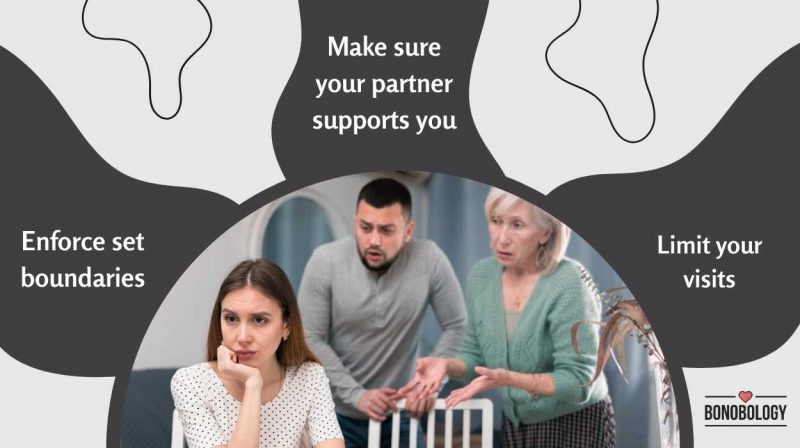While marriage can be a beautiful and fulfilling chapter in your life, as with any long-term relationship, it comes with its share of challenges. The biggest and, probably, the toughest challenge is dealing with the in-laws. Particularly if your in-laws are toxic and nag or criticize you nonstop. In such a situation, you may want to consider distancing yourself from in-laws for the sake of your peace of mind and the health of your marriage.
Now, bear in mind, distancing and cutting off toxic in-laws completely are two different things. While the latter may seem like the more appealing alternative, it’s not always a realistic option. Your in-laws will invariably be a part of your life in some way or form, and you must maintain respect and dignity toward them, even if you don’t receive it back.
Your best bet is distancing yourself from in-laws by setting a few boundaries and limiting your contact with them while maintaining a cordial and polite relationship. Keeping a healthy distance will help both sides and could, possibly, strengthen your bond with both your partner and in-laws. We are here to help you figure out how to strike this delicate balance.
When To Consider Distancing Yourself From In-Laws
Table of Contents
Only if we had the power to choose our in-laws! But sadly, we do not. They’re, by default, a part of the marriage package. If you’re lucky, your in-laws might be the nicest and most friendly people on earth. On the other hand, having to deal with manipulative in-laws can take a massive toll on your mental health and emotional well-being. In such cases, it’s best if you carefully weigh your interactions with them and begin distancing yourself from your in-laws.
Toxic in-laws behave in different ways. In a lot of cases, they tend to be cold because they feel threatened by you and that’s when in-laws exclude you from family discussions, activities, and conversations, making you feel like an outsider in your marriage. Or they may be overly critical of everything you do. In some cases, in-laws start meddling with your relationship with your spouse, willfully trying to cause tension and conflict.
Related Reading: How To Talk To Your Husband When The Other Woman Is His Mother
If you can get to the root of their hostile behavior, you might just be able to mend the relationship and build a strong bond with them. However, when you’re in the thick of such hostility, it can be hard to view the situation objectively. Besides, if your in-laws are toxic and don’t want to reciprocate your efforts to mend the relationship, there is nothing you can do but work toward distancing yourself from in-laws. Now, the question is how do you know when to keep trying to mend fences and when to consider distancing yourself from in-laws? Here are a few warning signs that can help you decide:
- They try to pit you and your partner against each other: If your in-laws are toxic, they will always try to turn you and your partner against each other over the most trivial matters. The result? You end up fighting with husband because of in-laws or your relationship with your wife becomes strained because of your meddling in-laws
- They exercise control over your married life: If your in-laws interfere with your decisions as a couple, then you have a problem. Toxic in-laws would expect you and your spouse to live your life the way they want. It’s their way of exercising control over your life and marriage
- They always put you down: If they always find fault with everything that you do, put you down in front of others, intentionally hurt you, or behave like you don’t exist, it’s a sign your in-laws are toxic and you need to get away from them
- They gossip about you in your absence: Disrespectful in-laws tend to badmouth or gossip about you to other people — friends, relatives, neighbors, or anyone willing to listen — when you’re not around
- They don’t respect your privacy or boundaries: Do your in-laws turn up unannounced? Are they always telling you what you should do and how you should behave? If they are, then it’s a sure-shot sign of toxicity. You should consider distancing yourself from in-laws and setting healthy boundaries
Distancing Yourself From In-Laws — 10 Tips That Almost Always Work
You need boundaries to maintain healthy relationships, not just with romantic partners but also with friends, family, neighbors, or coworkers. The relationship you share with your in-laws is no different. What these boundaries look like depends on the kind of equation you share with them. If the relationship is cordial, boundaries can mean deciding what parts of your marital life you share with your in-laws (or even your own family, for that matter). But if the relationship is strained or the in-laws are disrespectful, boundaries could be about distancing yourself from them.
Distancing yourself from in-laws does not mean snapping all communication or contact. Unless, of course, the dynamics are so troublesome that you see no alternative to cutting off toxic in-laws. In most cases, it just means limiting contact in a way that there’s no interference from their side in matters that do not concern them. But even that can be walking a tightrope. To make sure you don’t end up alienating or offending someone in the process (especially your spouse), here are 10 tips on distancing yourself from in-laws that almost always work:
Related Reading: 10 Ways To Impress Your Future Mother-In-Law
1. Make sure you have your partner’s support
Your in-laws are two of the most important people in your partner’s life, so be careful with your words when talking to your spouse about their parents. Your spouse should know that you’re having a hard time with their folks but don’t make it sound like you’re insulting or blaming them in any way as that may put your partner on the defensive. Remember, this decision means having to figure out how to distance yourself from family and that’s never easy, so you need to approach this conversation maturely.
When you broach the topic of distancing yourself from in-laws, be honest about how you feel, explain your reasons and, at the same time, listen to what they have to say. Your partner may get angry or be taken aback and it is absolutely normal. Make sure to communicate your thoughts respectfully. Give them time to process all the information. Don’t go down the slippery slope of fighting with husband because of in-laws or being in conflict with your wife over her family. There is nothing better than a partner’s support in moments like these.
Regina Wilkey, a consultant, spoke to us about her experience of dealing with the in-laws, “Even though my in-laws live four hours away from us, they are too involved in my and my husband’s life. I tried to walk away from them and avoid family events and calls but they are starting to condemn that. Through it all, the only thing that makes things easier is John’s support. When he defends me, I do not feel bad anymore. And this is because I always openly express my concerns to him.”
2. Set and enforce healthy boundaries

The best way of distancing yourself from in-laws is to set and enforce healthy boundaries. Make sure you discuss those boundaries with your spouse, talk about what’s important and what works for you, as a couple, then, communicate the same to your in-laws as well. You all need to be on the same page. Here are some examples of what setting boundaries with in-laws may look like:
- Don’t want your in-laws to show up at your door without notice? Tell them that you prefer to be informed beforehand
- If they’re interfering too much with your parenting style, politely but firmly tell them that you appreciate the advice but it’s not their place to intervene and you’d like to handle it your way
- If they have a habit of checking your drawers or documents, tell them that it’s your private space and you would want them to respect it
- To balance things out, figure out a plan for spending time together as a family at a frequency that is acceptable to everyone involved
3. Change the way you interact with them
As they say, you cannot teach an old dog new tricks. Your in-laws, having reached a certain age, maybe too set in their ways to appreciate another perspective and that often becomes the root of conflict in family dynamics. One way to deal with it is to change the way you interact with them. If trying to get your point across only leads to tension and friction, don’t.
You don’t have to explain or justify your choices to anyone, your extended family included
Yes, that means developing a thick skin and a water-off-a-duck-’s back approach to their nagging, criticism, or unsolicited advice, but it can work wonders in slowly but surely getting across the message that you will lead your life the way you see fit.
4. Don’t let them meddle in your relationship
If you have been fighting with husband because of in-laws or your relationship with your wife is strained because of her family, they’ve likely been meddling in your relationship with your spouse. While figuring out how to distance yourself from family is never easy, in this case, keeping the dynamics of your relationship private becomes necessary.
If your relationship with your in-laws permits it, have a direct conversation with them, in your spouse’s presence, about the adverse impact of the desire to have a say in your marriage. Respectfully but assertively, tell them that you need them to take a step back for the sake of everyone involved. If having a mature conversation with them is just not possible, ask your spouse to become an intermediary in conveying this.
Related Reading: 8 Signs of a Poisonous Mother-In-Law
5. Family time? Stick to a schedule
Make sure you stick to a schedule for spending time with your in-laws. As long as interaction between both parties is pleasant and comfortable, spending time together as a family should not be a problem. Ensure that plans are made beforehand to avoid unannounced visits. Picnics, family dinners, and Christmas or Thanksgiving gatherings are fun every once in a while no matter how crazy the in-laws can get.
While staying away from in-laws is a legitimate choice, do not cancel on them constantly. At the same time, don’t compromise on your plans or schedule to accommodate theirs. For example, if you had planned on spending Christmas at your parents’ house, stick to it. Don’t let your in-laws get in the way just because they’ve decided at the last minute that they’d love it if you spend the holidays with them.
It will send a clear message that they can’t just walk all over your plans or expect you to constantly do things their way. Also, if conversations at family gatherings get weird or make you feel uncomfortable, excuse yourself and spend that time with your spouse and kids instead. Even if that sends a clear message that you’re offended or unhappy, it is still a more decent way of going about it than lashing out.
6. Don’t take their jibes personally

One of the most important things to keep in mind if you’re considering distancing yourself from in-laws is to not take anything they say or do personally. For your own peace of mind, ignore the negative comments and jibes hurled at you or your kids or spouse. We understand how hard it can be but it is just necessary to keep the peace.
Adrian, a coffee shop owner who lives in Wisconsin with his wife, told us about how he thinks his wife’s parents constantly mock him. “They keep calling me a ‘barista’ and while I do not mind it, my father-in-law does it nonstop and my interfering mother-in-law always has career suggestions to offer. My sisters-in-law also keep joking about my work, trying to put me down. I am a business owner and I’m very happy about what I do. So I just ignore my in-laws now. I smile anytime they say such things and just do not respond.”
7. Avoid getting into arguments
There is no doubt that your in-laws are toxic if they make you feel inferior or constantly criticize you, find faults with everything that you do – work, parenting style, the way you run your house, and so on. We know how frustrating it can be to put up with that. However, letting them get to you and losing your cool isn’t going to help matters.
So, do your best to avoid getting into arguments with them. Remind yourself, it’s just a Thanksgiving dinner, a family outing, or a weekend that you have to get through. It’s best to keep your calm and ignore the taunts or criticism that come your way. Avoid topics that can act as triggers or lead to arguments.
Your in-laws will try to pick a bone with you in an attempt to get a reaction so they can point fingers at your behavior again. Don’t give them that satisfaction. Be firm in your response but keep your emotions under control.
8. Tell them if their advice doesn’t align with your lifestyle
“Oh, but in our day, we…” Any sentence that begins with these words — or something to that effect — inevitably leads to unsolicited advice about your life choices, your approach to parenting, or adjustment in marriage. It’s just so easy to get sucked in, and then the drama begins. You are hurt that they criticize you non-stop, they are offended that you responded rudely or made a snide remark.
So, what can you do in such a situation to get your in-laws off your back for good? Whenever they dole out unsolicited advice, politely tell them, “Well, I’m glad that worked for you. Unfortunately, it doesn’t align with our lifestyle.” Now, we make no promises that doing this once will get the message across. But keep repeating it consistently, and eventually, your in-laws will get the message and you will get some much-needed respite from having them breathing down your neck.
9. Don’t look to them for approval or validation
You possibly cannot learn how to distance yourself from family unless you stop seeking their approval or validation. Now, the need for approval from our parents (and that applies to a certain degree to parents-in-law) is hardwired in us. So, you and your partner will need to work on yourselves to stop needing that “attagirl” or “attaboy” from them.
Do the work necessary to get to the point where you can just go on with life, with conviction in your beliefs and choices, without worrying about your in-laws’ opinions. That’s when you’d have truly succeeded in distancing yourself from in-laws, irrespective of whether you’re living with in-laws, in close proximity to them, or miles away.
Related Reading: 10 Thoughts That Come To Your Mind When Your Mother-In-Law Visits You
10. Resort to silent treatment if nothing works
This should ideally be your last resort. If nothing else works, consider cutting off toxic in-laws by giving them the silent treatment and shutting them out of your life. If your in-laws refuse to abide by any of the boundaries you’ve set and continue interfering in your decisions and family life, take the silent treatment route.
It’ll send a clear message and they might just back off. Don’t react to what they say or how they behave. Don’t give them the power to control or manipulate your married life. Once they realize that their behavior, mind games, and actions do not affect you, they may well stop and give you some breathing room.
Key Pointers
- Wanting to maintain some distance from your in-laws is absolutely acceptable as long as you do it with respect and be polite about it
- Make sure that you and your spouse are on the same page and that you are not upsetting your spouse
- Meet your in-laws once in a while and don’t respond to them criticizing or meddling. Just stay calm and steer the conversation elsewhere
Marriage isn’t a walk in the park. It involves not just two people but two families. You’re suddenly burdened with extra responsibility and expectations, and navigating these new relationships can be hard, especially if you’re the only one making the effort. Don’t get us wrong. We are not saying all in-laws are toxic or disrespectful. But, if yours have sucked the life out of you, there’s no point in putting your time and effort into building a strong bond with them. If distancing yourself from in-laws reduces all the unnecessary drama and brings peace to your marriage, then do it without hesitation.
FAQs
Yes. It is absolutely normal to not like your in-laws. If they are disrespectful toward you and aren’t sensitive to your feelings or understanding of your needs, it’s okay to not be fond of them. It’s not a big deal
Notice their attitude toward you. If they constantly find faults with everything you do, exclude you from family plans, ignore you at gatherings, are passive-aggressive toward you, or intentionally hurt you, they probably don’t like you.
Think about what you want from your relationship with the in-laws. Make sure your partner is on your side. Communicate your point of view to your in-laws and try to understand theirs as well. Explain the boundaries you’ve set and give them time to adapt to it.
12 Things To Do When Your Husband Chooses His Family Over You
How Living In A Joint Family After Marriage Worked Out For Me
Your contribution does not constitute a charitable donation. It will allow Bonobology to continue bringing you new and up-to-date information in our pursuit of helping anyone in the world to learn how to do anything.






















Featured
Setting Boundaries With In-laws – 8 No-Fail Tips
The 7 Ways Mothers-In-Law Ruin Marriages – With Tips On How To Save Yours
12 Things To Do When Your Husband Chooses His Family Over You
10 Signs You Have A Toxic Daughter-In-Law And How To Deal With Her
15 Signs Your Mother-In-Law Hates You
How To Talk To Your Husband When The Other Woman Is His Mother
How To Impress Your In-laws In The First Meeting
10 Thoughts That Come To Your Mind When Your Mother-In-Law Visits You
10 Ways To Deal With Disrespectful In-laws
15 Clever Ways To Deal With A Manipulative, Scheming Mother-In-Law
How I Won Over My Boyfriend’s Mom
Please Don’t Call Her Selfish If She Doesn’t Want To Live With Her In-Laws
My Wife Was Abducted By Her Family Because I Was 15 Days Younger Than Her
How Destructive Are Indian In-Laws?
7 Tips For Men Who Are Stuck Between Wife And Mother In A Joint Family
My Marriage Was In Trouble Because Of My Sister-In-Law’s Stories
8 Signs of a Poisonous Mother-In-Law and 6 Ways to Beat Her at Her Game
How We Solved Interfaith Marriage Problems
Relationship with In-Laws: I was Scared of My Father-In-Law because…
5 reasons why the Indian family is killing the Indian marriage